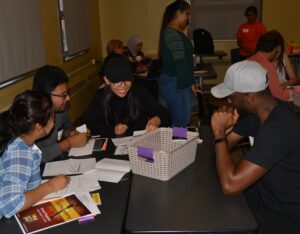Rowing Against the Wind
For many, the road to writing a master’s thesis is challenging and often filled with minefields. Now, imagine what it is like to write your first major publishable-quality academic paper in a language other than your native language. This will give you a sense as to the pathway Yuehua Zhu encountered on her way to defending her master’s thesis last week.
Yeuhua took my Research in Education class a year ago and, after learning about the magic of educational research, decided to pursue a master’s thesis. This was not easy for her. She gave it a great deal of thought and, in the end, began her journey. But she was rowing against the wind!
She used all of the support that was available, including weekly meetings with me and frequent visits to the Leddy Library Writing Support Desk. She also asked for feedback from her student colleagues, which helped a great deal.
Two of the members of Yuehua’s thesis committee were also of great help to her. Drs. Ma and Zhou provided wonderful advice to her on directions her research might go to achieve her stated purposes.
Yeuhua Zhu has completed a thesis which fills an important gap in the research literature by showing how student political participation impacts social integration, student sense of belonging, and English proficiency; all of which contribute to Chinese-origin student retention and success at Canadian post-secondary institutions.
Look for her thesis, “Enhancing Social Integration in Canadian Post-Secondary Educational Institutions for Students of Chinese-Origin through Political Participation.” It is outstanding.

Dr. Clayton Smith, Dr. George Zhou, and Dr. Zhenzhong Ma
-Clayton Smith
Using Personas to Enhance Understanding of International Student Learning
At this week’s UWindsor GATAcademy, I had the pleasure of presenting a workshop on “Connecting Best Practices for Teaching Linguistically-Diverse International Students with International Student Satisfaction.” While we presented some of the findings from our recent research on this topic, we did it with a bit of a student spin, which made it fascinating to present.
First, let me acknowledge the work of two students. Miranda Pecoraro, an Outstanding Scholar and 3rd year Social Work student, and Renan Paulino, a MITACS intern from Brazil. They took our research and developed it into a game that permitted participants to engage in both constructivism and experiential learning as they learned about ways we can enhance the teaching and learning of international students. This was the first time we tried it, and from all reports, it went well.
I would also like to commend three other students who served on our expert panel for the game. These students included Victor Sam (Computer Science, Ghana), Sumeet Kaur (Bachelor of Arts-Criminology, India), and Ahuying Zhuo (Law, China). And, of course, our international student advisor, Deena Wang, who was instrumental in organizing the day.

What we did was to build 5 personas representing international students at the University of Windsor and then provide the related teaching practices for each persona to a groups of participants. Each group was asked to select 10 practices (they were given an average of 20 to select from) they thought fit the assigned persona and then defend one of these to the wider group. The expert panel, using green (agree), red (disagree), and yellow (not sure) lollipop signs helped us understand how each teaching practice may or may not be appropriate for the persona. It was a wonderful display of constructivism and experiential learning.
In the end, the GAs and TAs came away from the workshop with a key point. As we approach our students, we need to learn enough about each student to determine what teaching practice will enhance learning, both inside and outside of the classroom. Factors such as country of origin, area of study, length of time studying abroad, and level of study all lead to better understanding of the learning preferences of international students.
This was fun!
-Clayton Smith

Recent Comments